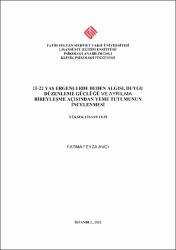| dc.contributor.advisor | Saltukoğlu, Gaye | |
| dc.contributor.author | Avcı, Fatma Feyza | |
| dc.date.accessioned | 2021-08-20T10:57:39Z | |
| dc.date.available | 2021-08-20T10:57:39Z | |
| dc.date.issued | 2021 | en_US |
| dc.identifier.citation | AVCI, Fatma Feyza, 18-22 Yaş Ergenlerde Beden Algısı, Duygu Düzenleme Güçlüğü ve Ayrılma Bireyleşme Açısından Yeme Tutumunun İncelenmesi, Fatih Sultan Mehmet Vakıf Üniversitesi Lisansüstü Eğitim Enstitüsü Psikoloji Anabilim Dalı Klinik Psikoloji Programı, Yayımlanmamış Yüksek Lisans Tezi, İstanbul 2021. | en_US |
| dc.identifier.uri | https://hdl.handle.net/11352/3859 | |
| dc.description.abstract | Bu çalışmanın amacı bireylerin yeme tutumlarının, ele alınan ölçek ve alt boyut puanları açısından cinsiyet, kilo, boy gibi sosyodemografik değişkenlerin yanında kilosunu değerlendirme ve daha önce diyet yapıp yapmama gibi değişken gruplarında da incelenmesidir. Araştırma 424 katılımcı ile yürütülmüştür. Veri toplama aracı olarak; Duygu Düzenleme Güçlüğü Ölçeği, Ayrılma Bireyselleşme Ölçeği, Hollanda Yeme Davranışı Anketi (DEBQ) ve Beden Algısı Ölçeği ve araştırmacı tarafından oluşturulan demografik bilgi formu kullanılmıştır. Yordayıcıların belirlenmesi için çoklu doğrusal regresyon modelleri tahmin edilmiştir. Tüm örneklemde beden algısı kısıtlayıcı yeme alt boyutunu yordamazken, beden algısının duygusal ve dışsal yemeyi yordadığı; duygusal yemenin kısıtlayıcı yemeyi yordadığı; kadınlar için yeme davranışını farkındalık, ilişkisel problemler ve duygusal yemenin yordadığı; erkekler için yeme davranışını ayrılma /farklılaşma, beden algısı ve açıklığın yordadığı görülmüştür. Anne babası sağ ve birlikte olan bireylerde yeme davranışlarını beden algıları ve duygusal yeme belirlerken, anne babası ayrı ve birisi vefat etmiş olanlarda yeme davranışlarını dürtü, amaçlar ve yine duygusal yeme belirlemektedir. Daha önce diyet yapanlarda da yapmayanlarda da beden algısı oldukça önemli bir yordayıcı olarak elde edilmiştir. Yine beden memnuniyetine olumlu yanıt veren bireylerde farkındalık ve duygusal yeme ön palandayken, olumsuz yanıt verenlerde beden algısı ön plandadır. Araştırmaya katılan bireylerin VKİ değerlerine göre zayıf, normal kilolu, fazla kilolu ve tip 1 obez olarak sınıflandırılmasında her bir sınıf için yeme davranışını ortak paydada yordayan beden algısı ve farkındalık olduğu görülmüştür. | en_US |
| dc.description.abstract | The aim of this study was to examine individuals' eating attitudes in variable groups such as evaluating their weight and whether they have dieted before, in addition to sociodemographic variables such as gender, weight, height, in terms of the scale and sub-dimensions considered. The participants consisted of 424 people. The instruments used was The Emotion Regulation Difficulty Scale, The Separation Individualization Scale, The Dutch Eating Behavior Questionnaire (DEBQ) and The Body Image Scale. Multiple linear regression analysis conducted to determine whether, body image, emotion regulation difficulty, separation-individualization and the subdimensions predicted eating attitudes. As a result of the multiple linear regression analysis conducted to predict the eating attitudes of individuals in terms of the scale and its sub-dimensions, it was seen that it predicted restrictive eating, emotional eating and external eating sub-dimensions. It was observed that for the body perception is the predictor of emotional and extrinsic eating in the whole sample; emotional eating predicts restrictive eating; awareness, relational problems and emotional eating predict eating behavior for women; it was observed that separation / differentiation, body perception and openness predicted eating behavior for men. While body perception and emotional eating determine eating behaviors in individuals whose parents are alive and together, in individuals whose parents are separated and someone has passed away, eating behaviors are determined by impulse, aims and again emotional eating. The prediction rate was found to be higher in individuals who spend their adolescence only with their mother, father alone or in dormitories compared to those who spend their adolescence with their family. Body perception has been very important in those who have dieted before and those who have not. While awareness and emotional eating are at the forefront of individuals who respond positively to body satisfaction, body perception is at the forefront in those who respond negatively. It was observed that when the individuals participating in the study are classified as underweight, normal weight, overweight and type 1 obese according to their BMI values, body perception and awareness sub-dimensions predict eating behavior in each group. | en_US |
| dc.language.iso | tur | en_US |
| dc.publisher | Fatih Sultan Mehmet Vakıf Üniversitesi, Lisansüstü Eğitim Enstitüsü | en_US |
| dc.rights | info:eu-repo/semantics/openAccess | en_US |
| dc.subject | Yeme Tutumları | en_US |
| dc.subject | Beden Algısı | en_US |
| dc.subject | Duygusal Yeme | en_US |
| dc.subject | Kısıtlayıcı Yeme | en_US |
| dc.subject | Dışsal Yeme | en_US |
| dc.subject | Eating Attitudes | en_US |
| dc.subject | Body Perception | en_US |
| dc.subject | Emotional Eating | en_US |
| dc.subject | Restrictive Eating | en_US |
| dc.subject | Extrinsic Eating | en_US |
| dc.title | 18-22 Yaş Ergenlerde Beden Algısı, Duygu Düzenleme Güçlüğü ve Ayrılma Bireyleşme Açısından Yeme Tutumunun İncelenmesi | en_US |
| dc.title.alternative | The Examination of Eating Attitudes in Adolescent Aged 18-22 in Terms of Body Perception, Emotion Regulation Difficulties and Seperation-Individuation | en_US |
| dc.type | masterThesis | en_US |
| dc.contributor.department | FSM Vakıf Üniversitesi, Lisansüstü Eğitim Enstitüsü, Psikoloji Ana Bilim Dalı | en_US |
| dc.relation.publicationcategory | Tez | en_US |



















